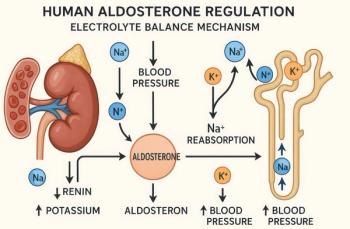
Potassium: Overlooked and Underappreciated in the Battle Against Hypertension
Potassium, an important component of blood pressure regulation, has been relatively forgotten.
I have been as guilty as the next guy. When high blood pressure is mentioned, the question of salt as Na+ Cl- is never far behind. It is high time to admit, however, that there is more to the hypertension “cation-anion” story than salt as Na+Cl-. Although potassium (K+) has been relatively forgotten by some (including yours truly), it is an important component of blood pressure regulation and in a very good and reproducible way.
Epidemiologic studies have demonstrated an inverse correlation between K+ intake and the prevalence of hypertension (yes, the opposite impact of Na+Cl- intake).1 For example:
• The Intersalt Study found that higher urinary K+ excretions (meaning a higher intake of K+) were associated with lower blood pressures, even when adjusted for Na+ intake.1,2
• Another study looked at K+ intake and age-adjusted diastolic blood pressure in 584 men and 718 women. Dietary Na+/K+ ratios correlated with what would be expected: more Na+, higher diastolic; more K+, the opposite.1,3
• A large French population study found results consistent with the preceding 2 studies with regard to K+ and lower blood pressures.1,4
For those who are not satisfied with observational studies, there have been prospective trials as well. In a 12-year study, investigators observed that increasing K+ intake by only 10 mEq/L per day resulted in a 40% reduction in stroke-associated mortality in 859 persons.1,5 Two other robust studies (The US Professional Men Cohort and the Nurses’ Health Study) reported similar results, finding that increased K+ intake was associated with a decrease in risk for stroke.1,6,7 Interventional studies that assessed the impact of K+ supplementation found the added micronutrient was effective in lowering blood pressure in hypertensive individuals, and particularly among African Americans with hypertension.1
Why is K+ supplementation effective in the arenas of CV disease and hypertension? Sodium retention occurs in response to K+ depletion and vice versa.1 K+ can stimulate endothelium-dependent vasodilatation.1 K+ may also increase nitric oxide synthesis.1 Other beneficial effects of K+ may reside in the lowering sympathetic activity and mitigating the negative actions of aldosterone.1
During my research for this commentary, I was struck by the vintage of the references cited in the first review.1 Many hearken back to the 1980s and 1990s. Even though Na+ intake can raise blood pressure, it appears that K+ is an underutilized cation in the hypertensive wars.
Maybe that old adage had it wrong all a long; it may be that “A banana a day keeps the doctor away”?
References:
1. Castro H, Raij L. Potassium in hypertension and cardiovascular disease. Semin Nephrol. 2013;33:277-289.
2. Intersalt Cooperative Research Group. Intersalt: an International study of electrolyte excretion and blood pressure. Results for 24 hour urinary sodium and potassium excretion. BMJ. 1988;97:319-328.
3. Khaw KT, Barrett-Connor E. The association between blood pressure, age and dietary sodium and potassium: a population study. Circulation. 1988;77:53-61.
4. Buyck JF, Blacher J, Kesse-Guyot E, et al. Differential associations of dietary sodium and potassium intake with blood pressure: a focus on pulse pressure. J Hypertens. 2009;27:1158-1164.
5. Khaw KT, Barrett-Connor E. Dietary potassium and stroke associated mortality. A 12-year prospective population study. N Engl J Med. 1987;316:235-240.
6. Ascherio A, Rimm EB, Hernan MA, et al. Intake of potassium, magnesium, calcium, and fiber and risk of stroke among US men. Circulation. 1998;98:1198-1204. (
7. Iso H, Stampfer MJ, Manson JE, et al. Prospective study of calcium, potassium, and magnesium intake and risk of stroke in women. Stroke. 1999;30:1772-1779. (
Newsletter
Enhance your clinical practice with the Patient Care newsletter, offering the latest evidence-based guidelines, diagnostic insights, and treatment strategies for primary care physicians.

































































































































